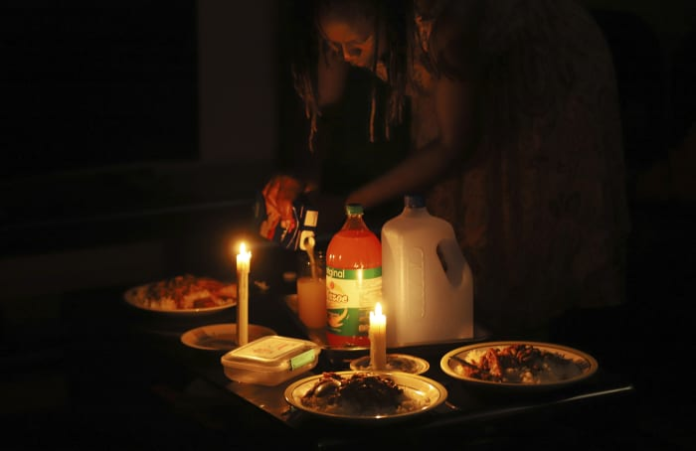A woman prepares a meal by candle light at her home in Harare, Zimbabwe, Tuesday, Dec. 20, 2022. A buoyant holiday mood is not lifting the country which is coping with widespread power outages and the world’s highest food inflation. (AP Photo)
HARARE – To brighten the festive season, the mayor of Zimbabwe’s capital, Harare, recently switched on Christmas lights in the city center. But for many, the event was just a reminder of two things they crave but can’t get: electricity and a happy holiday spirit.
Not even Mayor Jacob Mafume seemed confident that the capital city will see a sparkling Christmas.
“We do hope the electricity will remain during the time of the festive season,” he said at the lighting ceremony, which in past years has been marked by a cheery atmosphere. “At least today we have it (power) and we hope that as we go forward the lights will not go out.”
With the threat from COVID-19 receding, Zimbabwe has loosened restrictions on travel and gatherings. But a buoyant holiday mood is not lifting the country which is also coping with the world’s highest food inflation.
Globally, food prices have spiked as a result of the war in Ukraine and Zimbabweans are hard hit. The southern African nation of 15 million people has the world’s highest food inflation, at 321%, according to a World Bank food security update in December.
Zimbabweans traditionally use the end-of-year holidays to travel to rural areas to spend time with their families but this year inflation is making the trek home a challenge. Paidamoyo Gutsai, a motor mechanic, said that for the past two years he failed to go to his rural home in the eastern Manicaland province due to COVID-19 restrictions.
“This year it’s worse. Although I am allowed to travel and even hold a gathering, in reality, I can’t because I don’t have the money,” said the 41-year father of three, scanning the prices of food items in a supermarket. He steered clear of shelves with Christmas trees, decorations and lights.
Even if he could afford to buy twinkling lights, they require electricity and most households only get power between 11 p.m. and 4 a.m. It would be akin to throwing money down the drain, he said.
Street vendors selling Christmas trees and decorations say customers are few.
“Sometimes I just sell a single Christmas tree a day. That money is just for bus fare to go back home,” said Eunice Pfavi, a vendor. “I can’t even save for my own Christmas treat. Just affording food for the day feels like an achievement.”
The high food prices are forcing many to put aside Christmas shopping in order to focus on immediate needs.
“Spending is subdued. We are not recording a boom as should be the case during the festive period,” said Denford Mutashu, president of the Confederation of Zimbabwe Retailers. Spending in November fell by about 30%, he said.
Inflation, global supply chain bottlenecks, currency instability and rising fuel and food prices are “weighing heavily on consumer purchasing power,” said Fitch Solutions, the local subsidiary of the New York-based economic research firm. “Rising consumer price inflation has been the biggest threat to consumer expenditure in 2022, eroding buying power and diverting spending from discretionary items.”
Adding to the woes, electricity shortages that have been plaguing the country for years have worsened. Power generation at Kariba Dam, which usually provides about 70% of Zimbabwe’s electricity, has plummeted to about 300 megawatts down from its capacity of 1,050 megawatts. The drastic drop is because of poor rainfall over successive years which has made Kariba’s water levels so low that only minimal power generation is possible.
Coal-fired power stations that also provide some electricity are unreliable due to aging infrastructure that constantly breaks down. Zimbabwe boasts lots of sunny days, but the country’s solar potential has not yet been tapped on the scale needed to meet the nation’s needs. In recent months households and industries have gone for hours, and at times days, without electricity.
President Emmerson Mnangagwa’s government said it would import power from neighbors Zambia and Mozambique to brighten the festive season, but so far the country’s households have been largely dark.




